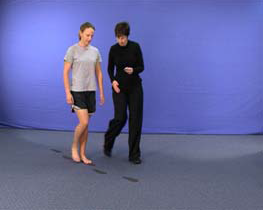AIM:
To train the patio-temporal aspects of walking
Rationale:
Whole-task training is set up so the patient can practice spatio-temporal aspects of walking with feedback. Training is structured so that flexibility of performance is encouraged, ie, the cognitive and/or physical demands of the activity are increased.
Equipment:
- Non-stick footprints
- Metronome
- Measuring tape (not shown in video)
- Stopwatch (not shown in video)
- Arm sling (if necessary)
Key Points:
- Patient is positioned in standing, feet shoulder-width apart, toes pointing forward, trunk, hips and knees extended
- Therapist determines appropriate step length and places footprint cues to indicate step length and width (not shown on video)
- The first step is taken with the intact leg
- Therapist is positioned to the side of the patient and provides stand-by supervision
- Ensure the following is taken into consideration when setting up training:
- Normal cadence is 120 steps/minute
- Normal velocity is 1.2 metres/second
- Step length and height are inter-related
- Therapist may monitor speed using a stopwatch and count number of steps over a known distance. Step length and cadence can be derived from these measures
Common Errors:
- Therapist does not stay close enough to steady the patient if necessary
- Therapist gives explanations or instructions while the metronome is “beeping”
Progression and Variety:
- Decrease/remove feedback
- Increase speed of movement
- Increase step length
- Increase cadence
- Increase cognitive demand

